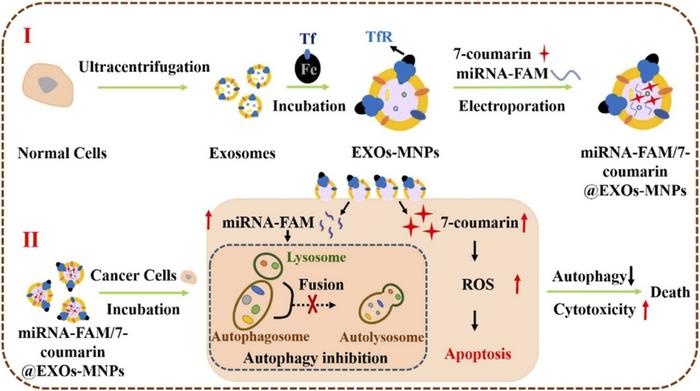Ovarian cancer is one of the most common malignancies in women worldwide. Unlike breast cancer, ovarian cancer lacks early diagnostic markers and does not show noticeable symptoms until cancer metastases, leading to a low survival rate for ovarian cancer patients. Traditional cancer treatments include surgery, radiation therapy, chemotherapy and interventional therapy. However, the distribution of chemotherapeutic drugs in vivo is non-specific and often toxic to healthy cells, leading to unsatisfactory efficacy.

Credit: Hua X., Liu Y., Liu X. et al
Ovarian cancer is one of the most common malignancies in women worldwide. Unlike breast cancer, ovarian cancer lacks early diagnostic markers and does not show noticeable symptoms until cancer metastases, leading to a low survival rate for ovarian cancer patients. Traditional cancer treatments include surgery, radiation therapy, chemotherapy and interventional therapy. However, the distribution of chemotherapeutic drugs in vivo is non-specific and often toxic to healthy cells, leading to unsatisfactory efficacy.
In a study published in the KeAi journal Biomedical Analysis, a group of researchers from China outline a new discrimination and treatment approach — a novel exosome-based drug delivery system that could improve the cell entry ability of drugs and the targeting of cancer cells. This approach provides a new drug delivery system and synergistic therapy idea, paving the way for future clinical applications.
“Exosomes are extracellular vesicles with lipid bilayers that have been extensively used as delivery vehicles for multiple drugs due to their high biocompatibility, low immunogenicity, the abilities to cross various biological barriers and evade the clearance by immune system,” explains the study’s corresponding author Songqin Liu, a professor at the Jiangsu Engineering Laboratory of Smart Carbon-Rich Materials and Device at Southeast University. “The synergistic cancer treatment by loading various nucleic acids and drugs into exosomes utilizes the advantages of different therapeutic approaches and has been applied to effectively treat cancers through the synergy of different treatment mechanisms.”
Autophagy is an intracellular degradative process where a cell engulfs its own cytoplasmic proteins or organelles and encapsulates them into autophagosomes. Many studies have shown that in cancer biology, autophagy plays a dual role in tumor promotion and inhibition. Notably, inhibition of autophagy shows potential in improving the clinical treatment of cancer patients.
“We constructed a novel antitumor exosome-based drug delivery system employing the synergistic effects of miRNA-regulated autophagy inhibition and coumarin anticancer drugs to achieve effective treatment of ovarian cancer,” says Xin Hua, first author of the study. “With the anti-tumor effects and intracellular visualization from 7-coumarin, the regulation of the autophagy process from encapsulated miRNA, the targeting of cancer cells from exosome, the synergistic effect and exosome-based drug delivery strategy for anti-cancer therapy showed promising prospects for in vitro and clinical applications.”
###
Contact the author: Songqin Liu, Jiangsu Engineering Laboratory of Smart Carbon-Rich Materials and Device, School of Chemistry and Chemical Engineering, Southeast University, Nanjing 211189, China. liusq@seu.edu.cn
The publisher KeAi was established by Elsevier and China Science Publishing & Media Ltd to unfold quality research globally. In 2013, our focus shifted to open access publishing. We now proudly publish more than 100 world-class, open access, English language journals, spanning all scientific disciplines. Many of these are titles we publish in partnership with prestigious societies and academic institutions, such as the National Natural Science Foundation of China (NSFC).
Journal
Biomedical Analysis
Method of Research
Experimental study
Subject of Research
Cells
Article Title
Engineered exosome-based drug delivery system for synergistic cancer therapy via autophagy inhibition and chemotherapy
COI Statement
The authors declare that they have no known competing financial interests or personal relationships that could have appeared to influence the work reported in this paper.



